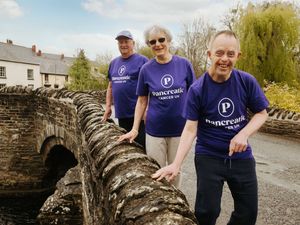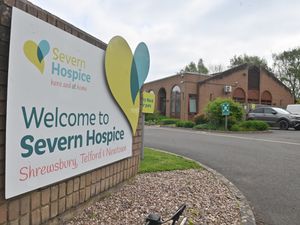How focus on NHS heroes has fed rush to get into nursing
The pandemic has brought into focus the work of those we rely on in the NHS. It has also prompted a new-found interest in a caring career.
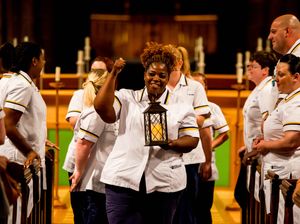
When Ruth Handley talks about careers in nursing, she speaks from the heart.
As a youngster she wasn’t academically minded, and in her late teens she faced the added challenge of bringing up a child alone.
But realising how she could make a difference to so many lives changed her whole outlook, and gave her a fresh sense of purpose which she now shares with the nurses of tomorrow.
“It’s the best thing I ever did,” says Miss Handley, who is now programme director of nursing at Wolverhampton University, which has a major presence in the city as well as Telford and Walsall.
“I’m so glad I did it.”
And it seems a lot of people feel the same way. New figures show a significant increase in the number of students applying for nursing degrees at UK universities, with applications up nearly a third on last year. It seems a combination of the coronavirus pandemic, coupled with a new recruitment drive by government has led to a surge in interest for people wanting to work on the wards.
And Miss Handley says the courses are now attracting people from all walks of life.
“Today, we get such a diverse section of the population doing our nursing degrees,” she says.
“Single parents, young people, people of all ages, black, Asian and minority ethnic backgrounds. And that is really important. We want people from all these different backgrounds to come into nursing.”
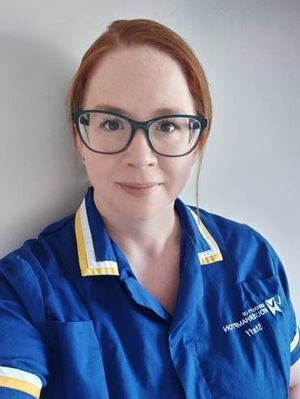
Latest figure show that a 32 per cent rise in the number of applicants for nursing courses, with 60,130 applying to universities across the UK. And the applications are coming from all age groups. While a record 16,560 applications have come from 18-year-old school leavers, up 27 per cent on last year, for mature students the growth is even more marked: 10,770 students over the age of 35 applied for courses starting this September, a rise of 39 per cent.
Miss Handley says the amount of media exposure surrounding the NHS has done a lot to increase interest.
“I think adult nursing is at the forefront of everybody’s mind at the moment, you see it all over the news,” she says. “The NHS seems to be at the heart of the whole country at the moment.”
Another reason for the rise could be concerns about the post-pandemic economy. Previous research by University and Colleges Admissions Service (Ucas) have shown that applications from older age groups tend to increase when the economy is not as strong. And in times of such uncertainty, it is perhaps unsurprising that a stable career path in a job that is always in demand will seem particularly attractive. Nursing degrees also come with a bursary of up to £8,000 a year, which helps on a course in which students will find themselves on a 12-hour night shift as part of their practice.
The Government has pledged to increase the number of registered NHS nurses by 50,000 over the next four years, and some commentators have said even more will be needed to cope with the post-Covid backlog.
Miss Handley says Wolverhampton University’s nursing students have no difficulty finding jobs at the end of the course.
“We have a 99 per cent employment rate,” she says. “People see it as a career opportunity, they know they are training for a job, not just a degree. It’s a very stable career, and there’s a chance of future development if you want it.”
Miss Handley says there has been a marked increase in interest in mental health nursing, which she puts down to a greater willingness in society for people to talk about such issues.
“We’ve had a 38-39 per cent increase in mental health nursing applications, we’ve definitely seen an increase in people interested in that as a viable career option,” she says. “Mental health needs are being seen as just as important as physical health needs. I think the pandemic has also made people more aware of this, with people suffering from social isolation.”

To cope with the extra demand, the university has recently seen a £5 million investment in its new health-and-social-care training centre at its Telford campus. The university also has nursing centres at its campuses in Wolverhampton and Walsall, as well as a further centre at Queen’s Hospital in Burton-on-Trent.
Miss Handley says the university has also broadened the number of routes into the profession, which gives opportunities to people from similar backgrounds to herself who may not necessarily have excelled at school, but through their own experiences have demonstrated the skills to make good nurses.
“We now offer a foundation year for people who haven’t got all the qualifications, but have got really good experience in health and social, so they can still study for degree level. It means they do a foundation year, and can study for four years rather than three.”
Carrie Eagleton has a very personal reason why she chose a career in nursing.
“I lost my dad when I was 15, and my mum became ill shortly after, and seeing the care gave to my mum and dad made me want to do the same for others,” she says.
Carrie, 27, is doing a four-year masters degree at Wolverhampton University’s Walsall campus, and since the start of her course she has picked up a wide variety of practical experience.
“I have worked in cardiology, trauma, orthopaedic, and I have also done a placement at a GP surgery in Walsall,” she says. “I have worked in imaging, helping with the X-rays and CT scans which I found to be very beneficial.”
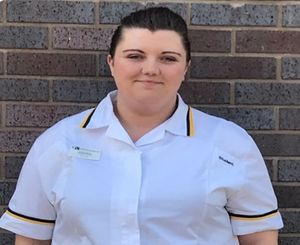
Carrie, who lives in Wednesbury, says like most jobs, nursing can have its stresses, but the rewards far outweigh them.
“It’s about working with people and seeing the difference you make,” she says.
“You can be having a really tough day, and then somebody says something really nice, and then you think it’s all worthwhile.
“Working in healthcare, you see the best in people, but you also see them at their most vulnerable. When they are going through a really tough time, that’s really hard, and it makes you realise how precious life can be.
“And seeing patients discharged can be a really emotional moment.”
While Carrie will leave university with a masters degree, she will still start at the same level as those who did the three year bachelor’s course. She believes doing the extra year now will help her later in her career, although she has yet to decide how she hopes to progress.
“I didn’t apply for the master’s course, but after the interview the lecturer who interviewed mentioned it to me. I love education and I love learning. I always wanted to do my master’s as well, so it made sense to do it all at once. If you’re looking for promotions in the future, you have got that extra year.”
In the meantime, she says she would like to work in A&E, or an acute admissions unit which provides specialised care for patients who have been admitted onto a ward after being taken to A&E.
The Edith Cavell department at Birmingham City University is one of the largest nursing studies department in the country.
Associate professor Kevin Crimmons, who heads the department, says the pandemic has made many people realise how important nursing is to society.
“Nurses have played a vital a role in the pandemic response and their professionalism, compassion and selfless dedication that has been there for all to see,” he says.
“Birmingham City University students have done their bit too with almost five hundred of them deployed to front line services over the last year in the fight against Covid.”
Like Wolverhampton, Birmingham City University has also widened access into nursing, and now runs an apprenticeship scheme.
Mr Crimmons says “Here at Birmingham City University we have expanded our provision to attract a broader range of people. That includes including mature students and career-changers as well as school leavers.
“Nursing is a challenging but immensely rewarding career and there are now different routes into the profession.”
How hospital care inspired Karen
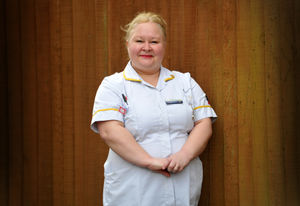
It was the experience of seeing the care given to her baby son that convinced Karen Roberts-Shepherd to apply for a child nursing degree.
“When my youngest was four months old, he had a severe bronchial illness, and he went to Walsall Manor Hospital,” says the 40-year-old mother-of-four, from the Pheasey area of Walsall. “He ended up being ventilated, and spent some time in intensive care, and it was the care he received that made me want to change my career path.”
Karen, now in the final year of her course at Birmingham City University, has never looked back, and says she is not surprised that there has been a rise in applications following the coronavirus pandemic.
“I think most people have felt inspired about the work that nurses do in helping to save lives,” she says. “They will think ‘maybe I can do that, I would like to make a difference.”
Karen, who previously worked as a PA at Wolverhampton University, was 38 years old when she started the course, but says she had no problem fitting in at all. “There are a good mix, there was one older than me, who was 54, and at the other end you have got the ones who had just finished their A-levels at the start of the course,” she says.
Her most recent placement was in the intensive care unit at Birmingham Children’s Hospital, which she says stretched her skills, but was extremely rewarding.
“It was quite difficult at times, but it was a good experience,” she says. “I have experience from both sides, both as a parent and as a student nurse, which is a help. You don’t just look after the children, you look after the whole family, the parents, the siblings and the grandparents.”
Karen says the lockdown has affected her studies, as all teaching is now done online rather than in the classroom, but this is something she has been able to adapt to. She says: “Dealing with the coronavirus has been a bit difficult, and I’ve got four children as well. But It’s so much more than a job. It’s so rewarding, to put a smile someone’s face, to try to improve their quality of life.”
Pandemic a unique challenge for Chris
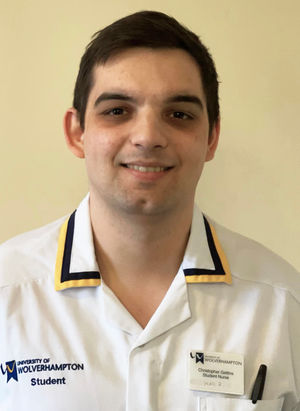
For Chris Gettins, studying for a nursing degree was the natural progression after working for a number of years as a healthcare assistant.
The 23-year-old is now in the second year of his course at Wolverhampton University, which has nursing campuses in Telford and Walsall.
He has spent time on placement in the gastro ward at the city’s New Cross Hospital, and also at a rehabilitation unit in the Sedgley area of Dudley as well as a community mental health team.
He says that doing his nurse training during the coronavirus pandemic has been an interesting experience, and it has been a privilege to be able to play a role during such a difficult time.
“A lot of people have been quite frightened by the pandemic.
“But for a student nurse it’s something out of the ordinary, and we are relishing the fact that we are able to go out and play a role. It’s not something that you come across every day,” he says.
“We work with experienced nurses who, over the years, might never have known a pandemic before.
“We were working throughout the pandemic, something that will prove valuable in future, as well as the fact that we have been contributing on the front line.”
Chris is following in the footsteps of his mother who worked as a nurse, as well as his father who used to be a private ambulance driver.
He is specialising in mental health, a course that is gaining freshj interest from prospective students.
And he says he would like to either work in forensic health care or the prison service when he graduates.
“I would like to work in the prison service because of the link between offending and mental health problems,” he says.
“I wanted to work in mental health because it used to be one of those taboo subjects. It’s ok now to speak about mental health.”
And Chris, who moved from Lancashire to study at Wolverhampton, says he definitely plans to stay in the West Midlands when he graduates.


